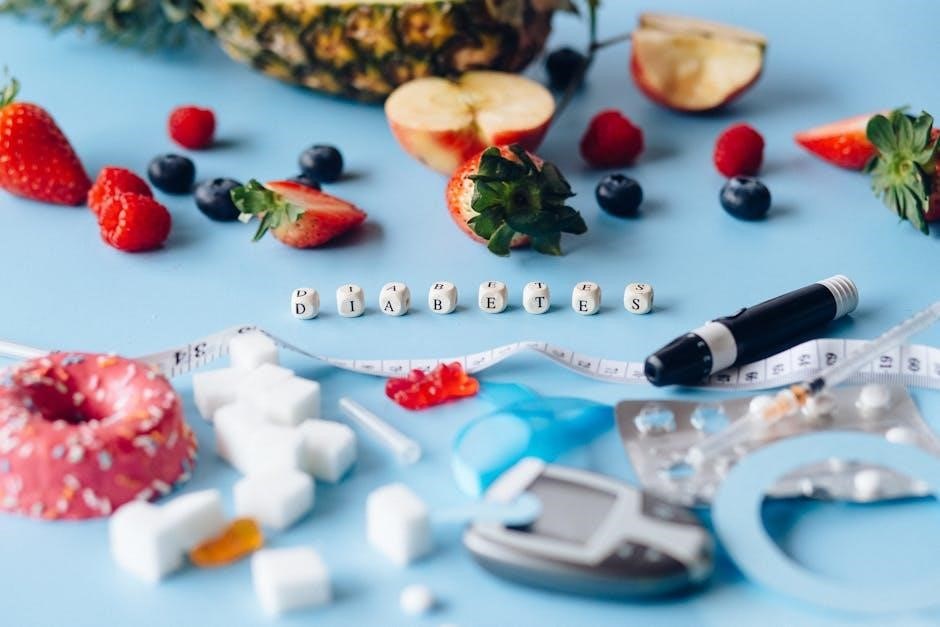
A structured 7-day PCOS diet plan helps stabilize blood sugar‚ improve insulin resistance‚ and manage symptoms like weight gain and hormonal imbalances. It provides a practical guide for healthy eating‚ reducing stress around food choices‚ and promoting long-term consistency in managing PCOS symptoms effectively.
Overview of PCOS and the Role of Diet
Polycystic ovary syndrome (PCOS) is a hormonal disorder affecting women of reproductive age‚ often causing irregular periods‚ weight gain‚ and insulin resistance. Diet plays a crucial role in managing symptoms‚ as it helps regulate blood sugar levels and improve insulin sensitivity. By focusing on whole‚ unprocessed foods‚ women with PCOS can reduce inflammation and promote hormonal balance. While some diets like keto or intermittent fasting are popular‚ the evidence suggests that a balanced approach emphasizing nutrient-dense meals is most effective. Avoiding refined sugars and processed foods is key‚ as these can exacerbate insulin resistance. A well-structured diet not only supports weight management but also enhances energy levels and overall well-being‚ making it a cornerstone of PCOS management.
Importance of a Structured Meal Plan for PCOS Management
Importance of a Structured Meal Plan for PCOS Management
A structured meal plan is essential for managing PCOS symptoms‚ as it provides consistency and reduces stress around food choices. By planning meals in advance‚ individuals can ensure they’re meeting nutritional needs and avoiding triggers like refined sugars and processed foods. This approach helps stabilize blood sugar levels‚ improving insulin sensitivity and hormonal balance. A well-organized plan also promotes healthy weight management‚ which is critical for many with PCOS. Additionally‚ it encourages the consumption of whole‚ nutrient-dense foods‚ boosting energy levels and overall health. A structured plan acts as a roadmap‚ making it easier to stick to dietary goals and achieve long-term benefits for PCOS management.
Key Principles of the PCOS Diet
The PCOS diet focuses on balancing macronutrients‚ emphasizing whole‚ unprocessed foods‚ and staying hydrated to support hormone regulation and overall health.
Balancing Macronutrients for Hormone Regulation
Balancing macronutrients is crucial for hormone regulation in PCOS. Protein helps stabilize blood sugar and insulin levels‚ while healthy fats support hormone production. Complex carbohydrates provide sustained energy and fiber‚ which aids in blood sugar control. A diet rich in whole foods ensures proper nutrient absorption‚ reducing inflammation and promoting hormonal balance. This approach helps improve insulin sensitivity‚ manage weight‚ and alleviate symptoms like acne and irregular cycles. By focusing on balanced macronutrients‚ individuals with PCOS can create a sustainable eating plan that supports long-term health and well-being.
Focus on Whole‚ Unprocessed Foods
Emphasizing whole‚ unprocessed foods is a cornerstone of the 7-day PCOS diet plan. These foods‚ such as vegetables‚ fruits‚ lean proteins‚ and whole grains‚ provide essential nutrients and fiber‚ which help regulate blood sugar and insulin levels. Avoiding processed foods and refined sugars reduces inflammation and supports hormonal balance. Incorporating these foods into meals ensures sustained energy and promotes a healthier metabolic state‚ which is vital for managing PCOS symptoms. By prioritizing whole foods‚ individuals can create meals that are both nourishing and delicious‚ setting a strong foundation for long-term health and symptom management. This approach also helps in maintaining a balanced diet that supports overall well-being and reduces the risk of related health complications.
Hydration and Its Impact on Hormonal Balance
Proper hydration plays a crucial role in maintaining hormonal balance and overall health‚ especially for those with PCOS. Drinking enough water supports the body’s natural detoxification processes‚ helping to eliminate toxins that can disrupt hormone function. Even mild dehydration can exacerbate PCOS symptoms‚ such as fatigue and insulin resistance. Aim to drink at least 8-10 glasses of water daily‚ and consider incorporating herbal teas or electrolyte-rich beverages to enhance hydration. Staying hydrated not only supports energy levels but also aids in regulating blood sugar and insulin sensitivity‚ which are key factors in managing PCOS effectively. By prioritizing hydration‚ individuals can take a simple yet impactful step toward balancing their hormones and improving their overall well-being.

7-Day PCOS Meal Plan
This structured plan offers balanced nutrition across 7 days‚ focusing on protein‚ fiber‚ and healthy alternatives to cravings. Each day emphasizes hydration and consistency to support hormonal balance and symptom management.
Day 1: Breakfast‚ Lunch‚ and Dinner Ideas
Start your day with a Greek yogurt parfait‚ layered with chia seeds and fresh berries for a boost of fiber and protein. For lunch‚ enjoy a grilled chicken salad with mixed greens‚ cherry tomatoes‚ and a light vinaigrette. Dinner features beef tacos using low-carb tortillas‚ paired with a colorful medley of sautéed vegetables. These meals are designed to balance blood sugar‚ reduce cravings‚ and provide essential nutrients to support hormone regulation and energy levels throughout the day.
Day 2: Balanced Nutrition for Each Meal
Begin Day 2 with avocado and egg toast‚ featuring whole-grain bread‚ mashed avocado‚ and poached eggs‚ seasoned with red pepper flakes for added flavor. Lunch includes a turkey and avocado wrap in a low-carb tortilla‚ paired with a side of mixed greens. Dinner showcases grilled salmon‚ quinoa‚ and steamed broccoli‚ providing a rich source of omega-3 fatty acids and fiber. These meals are carefully crafted to maintain stable blood sugar levels‚ reduce inflammation‚ and support hormonal balance; The focus is on lean proteins‚ healthy fats‚ and complex carbohydrates to keep you energized and satisfied throughout the day while adhering to PCOS-friendly dietary guidelines.
Day 3: Incorporating Protein and Fiber
Start Day 3 with a Greek yogurt parfait‚ layering chia seeds‚ fresh berries‚ and a drizzle of honey for a protein-packed breakfast. Lunch features a chicken and vegetable stir-fry with brown rice‚ ensuring a balance of lean protein and fiber. Dinner includes zucchini noodles with turkey meat sauce‚ alongside a mixed green salad with olive oil dressing. These meals emphasize high-quality protein sources like chicken and turkey‚ paired with fiber-rich vegetables and whole grains to support blood sugar stability and satiety. The focus on whole‚ unprocessed foods helps reduce inflammation and promotes hormonal balance‚ aligning with PCOS management goals. This structured approach ensures nutrient-dense meals that are both satisfying and beneficial for overall health.
Day 4: Healthy Alternatives for Cravings
Day 4 focuses on satisfying cravings with healthier alternatives. Breakfast includes sweet potato avocado toast topped with a poached egg and a sprinkle of red pepper flakes. Lunch features a taco salad with romaine lettuce‚ ground turkey‚ avocado‚ and a homemade vinaigrette. Dinner offers stuffed bell peppers filled with quinoa‚ lean ground beef‚ and spices. These meals provide nutrient-dense options to curb cravings while maintaining blood sugar balance. Incorporating flavors and textures keeps meals satisfying‚ reducing the urge for unhealthy snacks. This approach supports PCOS management by focusing on whole‚ unprocessed foods that promote hormonal stability and weight management.
Day 5: Meal Prepping for Consistency
Meal prepping is a key strategy for maintaining consistency in your PCOS diet plan. Start the day with a Greek yogurt parfait layered with chia seeds and berries for a protein-packed breakfast. Lunch features grilled salmon with steamed broccoli and a side of avocado‚ providing omega-3 fatty acids and healthy fats. Dinner includes zucchini noodles with turkey meat sauce and mixed greens‚ offering a low-carb and fiber-rich option. Snacks like boiled eggs or a handful of nuts can help curb cravings. Prepping meals in advance ensures healthy choices‚ reduces stress‚ and saves time. This approach helps maintain blood sugar balance and supports hormonal regulation‚ making it easier to stick to your PCOS-friendly diet long-term.
Day 6: Varying Protein Sources
Day 6 focuses on incorporating a variety of protein sources to keep meals interesting and nutritionally balanced. Breakfast includes scrambled eggs with spinach and whole-grain toast‚ providing lean protein and fiber; Lunch features a grilled chicken breast salad with mixed greens‚ cherry tomatoes‚ and a light vinaigrette‚ ensuring ample protein and vitamins. Dinner offers baked salmon with quinoa and steamed asparagus‚ rich in omega-3 fatty acids and antioxidants. Snacks like a small handful of almonds or a protein smoothie with Greek yogurt and berries add variety. Varying protein sources helps maintain muscle mass‚ regulates blood sugar‚ and keeps meals satisfying‚ making it easier to stick to the PCOS diet plan while supporting overall health and hormonal balance.
Day 7: Final Day of the Meal Plan
Conclude the week with a nutrient-rich final day to reinforce healthy habits. Breakfast features a Greek yogurt parfait with fresh berries‚ chia seeds‚ and a drizzle of honey for sustained energy. Lunch includes a grilled turkey and avocado wrap with mixed greens in a whole-grain tortilla‚ providing lean protein and healthy fats. Dinner offers baked cod with a side of roasted sweet potatoes and steamed green beans‚ ensuring a balance of omega-3s and fiber. Snacks like a small apple with almond butter or a handful of trail mix keep energy levels steady. This final day emphasizes whole‚ unprocessed foods to support blood sugar stability and hormonal balance‚ helping you feel accomplished and prepared to continue your PCOS-friendly diet journey beyond the 7-day plan.

Foods to Eat and Avoid
Focus on whole‚ unprocessed foods like whole grains‚ lean proteins‚ and healthy fats. Avoid refined carbs‚ sugary drinks‚ and processed foods to manage PCOS symptoms effectively.
- Foods to Eat: Whole grains‚ non-starchy vegetables‚ lean meats‚ fatty fish‚ and healthy fats.
- Foods to Avoid: Refined carbohydrates‚ sugary beverages‚ processed snacks‚ and excessive dairy.
Best Foods for Managing PCOS Symptoms
Incorporating nutrient-dense foods is essential for managing PCOS symptoms. Focus on whole‚ unprocessed foods like whole grains‚ non-starchy vegetables‚ lean proteins‚ and healthy fats. These foods help stabilize blood sugar levels‚ improve insulin sensitivity‚ and support hormonal balance. Leafy greens‚ such as spinach and kale‚ are rich in antioxidants and fiber‚ which aid in detoxification and digestion. Fatty fish like salmon and mackerel provide omega-3 fatty acids‚ reducing inflammation. Avocados and nuts are excellent sources of healthy fats‚ promoting satiety and hormone regulation. Berries‚ like blueberries and raspberries‚ offer antioxidants that combat oxidative stress. Incorporating these foods into your diet can help alleviate PCOS symptoms and promote overall well-being.
- Whole Grains: Quinoa‚ brown rice‚ and oats provide sustained energy and fiber.
- Proteins: Chicken‚ turkey‚ and fish support lean muscle mass and hormone balance.
- Vegetables: Broccoli‚ bell peppers‚ and asparagus are rich in vitamins and minerals.
- Healthy Fats: Avocados‚ olive oil‚ and nuts promote heart health and satiety.
Foods to Limit or Avoid
To effectively manage PCOS symptoms‚ it’s crucial to limit or avoid certain foods that can worsen insulin resistance‚ inflammation‚ and hormonal imbalances. Processed foods‚ refined carbohydrates‚ and sugary beverages should be minimized‚ as they cause rapid spikes in blood sugar and insulin levels. Foods high in saturated fats‚ such as fried foods and red meat‚ can increase inflammation and worsen symptoms. Additionally‚ limiting foods with advanced glycation end (AGE) products‚ like heavily cooked or processed meats‚ is recommended‚ as they can contribute to oxidative stress. Avoiding these foods helps create a more balanced and PCOS-friendly diet‚ promoting better hormonal regulation and overall health.
- Processed Foods: Avoid foods like chips‚ baked goods‚ and ready-to-eat meals.
- Refined Carbs: Limit white bread‚ pasta‚ and sugary snacks.
- Sugary Drinks: Avoid sodas‚ juices‚ and sweetened beverages.
- Saturated Fats: Reduce intake of fried foods and processed meats.

Grocery Shopping Tips
Plan meals and make a grocery list to ensure healthy choices. Focus on whole‚ unprocessed foods like vegetables‚ lean proteins‚ and whole grains to support PCOS management effectively.
- Shop the Perimeter: Prioritize fresh produce‚ meats‚ and dairy products.
- Avoid Aisles: Limit processed and packaged foods.
Essential Items for the 7-Day Plan
Stocking your pantry with whole‚ nutrient-dense foods is crucial for the 7-day PCOS diet plan. Focus on whole grains like quinoa‚ brown rice‚ and oats‚ which help stabilize blood sugar levels. Incorporate lean proteins such as chicken‚ turkey‚ and fish‚ as well as plant-based options like lentils and beans. Healthy fats‚ including avocados‚ olive oil‚ and nuts‚ are essential for hormone balance. Fresh vegetables like leafy greens‚ broccoli‚ and bell peppers should be a staple. Low-sugar fruits such as berries and apples are ideal for snacks. Don’t forget herbs and spices to add flavor without added sugars or salts. These items provide the foundation for balanced‚ PCOS-friendly meals that support energy and symptom management.
- Proteins: Chicken‚ fish‚ tofu‚ and legumes.
- Vegetables: Spinach‚ zucchini‚ and colorful vegetables.
- Fruits: Berries‚ apples‚ and citrus fruits.
- Grains: Quinoa‚ oats‚ and whole-grain bread.
- Fats: Avocado‚ nuts‚ and olive oil.
Smart Shopping for Healthy Choices
Smart shopping is essential for adhering to the 7-day PCOS diet plan. Start by planning your meals and creating a structured grocery list to avoid impulse purchases. Focus on whole‚ unprocessed foods like fresh vegetables‚ lean proteins‚ and whole grains. Read food labels to avoid hidden sugars‚ artificial additives‚ and unhealthy fats. Shop the perimeter of the store‚ where fresh produce‚ meats‚ and dairy products are typically located. Incorporate budget-friendly options like seasonal fruits and vegetables or bulk purchases of grains and nuts. By making intentional‚ informed choices‚ you can stock your pantry with nutrient-dense foods that support hormone balance and overall health.
- Plan meals and create a grocery list.
- Prioritize whole‚ unprocessed foods.
- Read labels to avoid hidden sugars and unhealthy fats.
- Shop the store perimeter for fresh items.
- Incorporate budget-friendly‚ seasonal choices.

Pantry Staples
Pantry staples for a 7-day PCOS diet include whole grains‚ proteins‚ healthy fats‚ and spices. These essentials support blood sugar balance and hormone regulation for optimal health.
- Whole grains: Quinoa‚ brown rice‚ oats.
- Proteins: Nuts‚ seeds‚ legumes‚ and lean meats.
- Healthy fats: Avocado oil‚ olive oil‚ and coconut oil.
- Spices: Turmeric‚ cinnamon‚ and herbs for flavor.
Must-Have Ingredients for PCOS-Friendly Meals
Stocking your pantry with the right ingredients is crucial for managing PCOS symptoms. Whole grains like quinoa‚ brown rice‚ and oats provide sustained energy and fiber. Lean proteins such as chicken‚ fish‚ tofu‚ and legumes support hormone balance. Healthy fats‚ including avocados‚ nuts‚ seeds‚ and olive oil‚ reduce inflammation. Incorporate fiber-rich foods like berries‚ leafy greens‚ and cruciferous vegetables to regulate blood sugar. Low-glycemic index vegetables like broccoli‚ spinach‚ and zucchini are ideal for insulin sensitivity. Herbs and spices like turmeric‚ cinnamon‚ and ginger add flavor while offering anti-inflammatory benefits. These ingredients form the foundation of a balanced and PCOS-friendly diet‚ helping to stabilize hormones and improve overall health.
Healthy Snack Ideas
Nuts‚ seeds‚ and veggies with hummus are great PCOS-friendly snacks. Greek yogurt with berries and hard-boiled eggs also provide quick‚ nutrient-rich options to curb cravings and stabilize blood sugar.
These snacks support hormone balance and energy levels throughout the day.
Quick and Nutritious Snacking Options
Healthy snacks are essential for managing PCOS symptoms like cravings and blood sugar fluctuations. Opt for nutrient-dense options such as nuts‚ seeds‚ and fresh fruits. Veggies like carrots or cucumbers paired with hummus make for a satisfying crunch. Greek yogurt with berries is another excellent choice‚ offering protein and fiber. Hard-boiled eggs or a handful of trail mix with unsweetened dried fruits also provide quick energy. These snacks are easy to prepare‚ portable‚ and align with PCOS dietary goals. Incorporating these options into your daily routine helps maintain energy levels and supports hormonal balance without compromising on nutrition.
They are perfect for busy days and keep you on track with your PCOS management plan.

Exercise Recommendations
Regular physical activity enhances insulin sensitivity‚ aids in weight management‚ and reduces inflammation‚ all beneficial for PCOS. Aim for at least 30 minutes of moderate exercise daily‚ combining cardio and strength training for optimal results.
Physical Activity to Support Diet
Exercise plays a crucial role in managing PCOS symptoms by improving insulin sensitivity‚ reducing inflammation‚ and aiding in weight management. Regular physical activity helps regulate menstrual cycles and enhances overall hormonal balance. Aim for at least 30 minutes of moderate-intensity exercise most days of the week. This can include activities like brisk walking‚ cycling‚ swimming‚ or strength training. Combining cardio with resistance exercises can further boost metabolic health and energy levels. Consistency is key‚ as regular movement supports long-term weight management and symptom control. Incorporating physical activity into your daily routine complements the dietary changes outlined in the 7-day PCOS diet plan‚ promoting a healthier and more balanced lifestyle.
Tracking Progress
Monitor symptoms‚ weight‚ and energy levels daily. Track menstrual cycles and hormonal changes; Adjust the diet plan as needed to optimize results and manage PCOS symptoms effectively.
Monitoring Symptoms and Adjustments
Tracking your progress is essential for understanding how the 7-day PCOS diet plan impacts your health. Monitor symptoms like energy levels‚ weight changes‚ and menstrual regularity. Keep a journal to document daily observations‚ including any side effects or improvements. Adjust the meal plan based on how your body responds‚ ensuring nutrient balance and satisfaction. If weight loss is a goal‚ measure progress weekly. Pay attention to hormonal changes‚ such as improved skin clarity or reduced acne. Regularly assess blood sugar levels and insulin sensitivity‚ as these are key indicators of PCOS management. Use this data to fine-tune your diet‚ incorporating more of what works and reducing what doesn’t. Consistency and patient self-monitoring are vital for long-term success and symptom relief.
Long-Term Consistency
Maintaining a healthy lifestyle beyond 7 days is crucial for managing PCOS symptoms. Focus on building sustainable habits that promote hormonal balance and overall well-being over time.
Maintaining a Healthy Lifestyle Beyond 7 Days
Maintaining a healthy lifestyle beyond the 7-day plan is essential for long-term PCOS management. Focus on balanced nutrition‚ hydration‚ and regular physical activity to support hormonal balance. Incorporate whole‚ unprocessed foods‚ lean proteins‚ and fiber-rich meals to stabilize blood sugar and improve insulin sensitivity. Avoid restrictive diets and instead aim for sustainable habits that promote overall well-being. Stay hydrated to support detoxification and energy levels. Exercise regularly‚ such as walking or strength training‚ to enhance insulin sensitivity and weight management. Cultivate a positive mindset by setting realistic goals and celebrating small achievements. Over time‚ these habits will become second nature‚ helping you manage PCOS symptoms effectively and improve your quality of life.

Downloadable PDF
The 7-Day PCOS Diet Plan PDF is a free‚ easy-to-download resource offering a structured meal plan‚ recipes‚ and grocery lists to help manage PCOS symptoms. It focuses on stabilizing blood sugar‚ improving insulin resistance‚ and promoting weight management. The PDF provides a practical guide for making sustainable lifestyle changes‚ ensuring long-term benefits for hormonal balance and overall health. Access it instantly without needing to provide email or personal details‚ making it a convenient tool for starting your PCOS management journey.
Accessing the 7-Day PCOS Diet Plan PDF
Accessing the 7-Day PCOS Diet Plan PDF is simple and hassle-free. The PDF is available for immediate download without requiring any personal information or email sign-up. It provides a comprehensive guide‚ including meal plans‚ recipes‚ and grocery lists‚ designed to help manage PCOS symptoms. The plan focuses on balancing blood sugar levels‚ improving insulin resistance‚ and promoting weight management. By following this structured approach‚ individuals can make sustainable lifestyle changes that support hormonal balance and overall health. The PDF is a valuable resource for anyone looking to take control of their PCOS symptoms through diet‚ offering practical and actionable advice for long-term well-being.